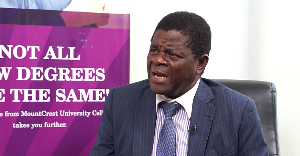Ghana Growth & Development Platform (GGDP), an economic think-tank, has asked government to put in place a contingency plan that would absorb shocks to Ghana’s oil and gas industry if the final ruling of the International Tribunal on the Law of the Sea in 2017 on the maritime dispute between Ghana and Cote d’Ivoire does not favour Ghana.
According to the think-tank, though the merits of Côte d’Ivoire’s case may not be sustained in the final ruling, there would be significant risks if the Tribunal rules in favour of Côte d’Ivoire come 2017.
“Contracts will have to be renegotiated, rights will have to be transferred, investment costs may have to be recovered, projects will have to be delayed, and of course there will be a host of legal challenges.
“Ghana needs to plan against some of these likely events and act strategically within broader national and regional interests,” it mentioned in its latest release endorsed by Theo Acheampong, the interim vice chairman.
It said pending the Court’s full ruling in about two years’ time, the suspension of new exploration activities (licensing, seismic surveys, etc) does not in anyway affect all future exploration, as the substantive case has not been fully adjudicated upon.
“Technically, Côte d’Ivoire has won ‘Round 1’ of this bout given that they had nothing to lose ex-ante, whereas Ghana has been forced to curtail parts of its oil exploration activities in the disputed maritime boundary.”
GGDP stated that the ruling has certain implications for Ghana’s emerging oil and gas industry even at the prima facie level, as the Court granted parts of the provisional measures sought by Côte d’Ivoire.
Luckily, the TEN field, currently in the development phase with over US$2bn already incurred by Tullow and other JV partners, will not have to be suspended for the two-year period until the resolution of the case in 2017.
The TEN Project, together with Jubilee and Sankofa gas anchor Ghana’s medium term energy security goals since gas from the field is expected to contribute significantly to thermal power generation, as Ghana weans herself of supply from the unreliable West African Gas Pipeline (WAGP).
It is estimated that production which will be 30mmscfd of gas initially in 2017 will be ramped up later to 170mmscfd, but will plateau at about 80,000 bbls of oil per day.
Ghana currently needs about 191mmscfd to power its thermal plants. This is projected by the Ministry of Energy to grow to 265 mmscfd in 2020 and 584 mmscfd by 2030.
“There is currently no contingency plan within Ghana’s budgetary provisions to forestall the impact of curtailed production on public finances. In other words, Ghana and its partners have potentially averted the loss of about US$2.2bn of revenues even at a conservative $70 per barrel oil price had the Court ruled that production had to be stopped or curtailed.
“We do, however, need to have a backup plan and also estimate the impact of lost revenues on public finances post 2017 if the ruling then doesn’t go our way.”
Business News of Wednesday, 6 May 2015
Source: Daily Guide



















